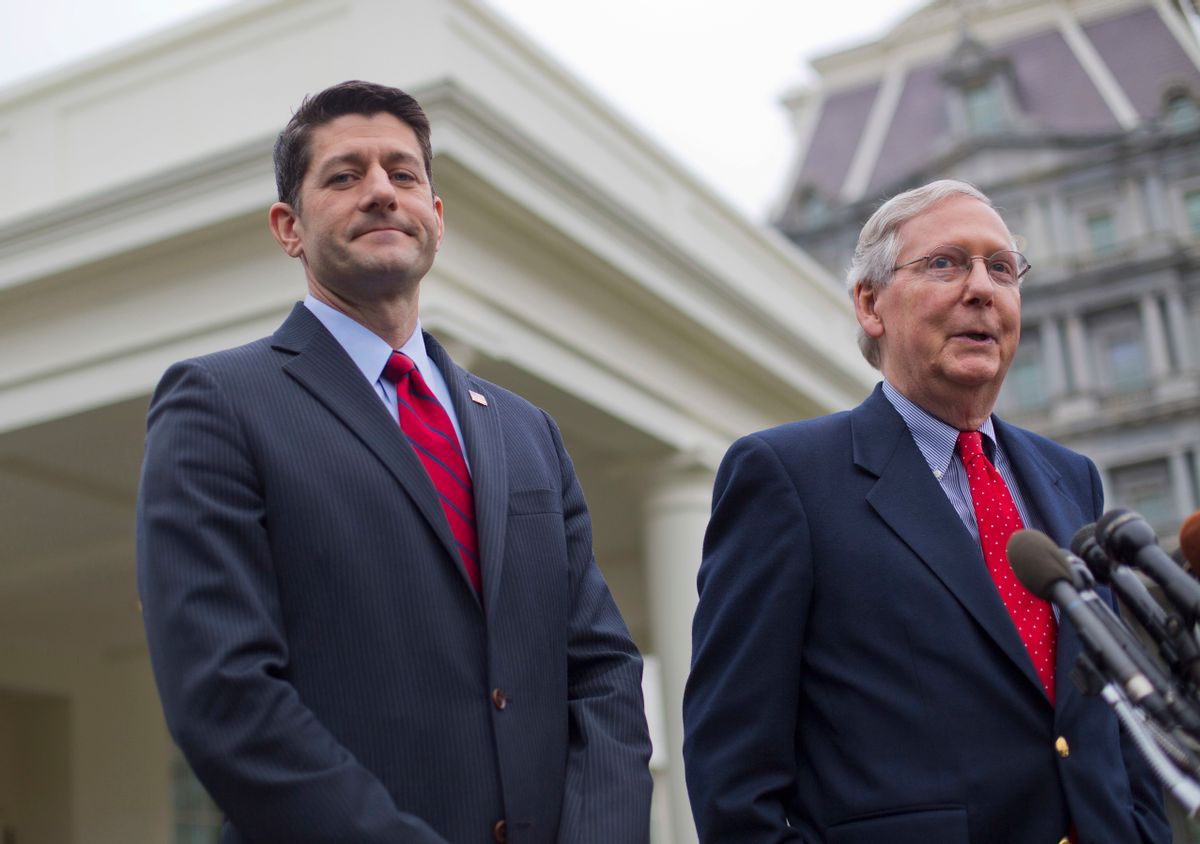Despite President Donald Trump's continued efforts to verbally bludgeon the congressional GOP into returning to the issue of health care, Senate Majority Leader Mitch McConnell and Speaker of the House Paul Ryan appear to be trying to move on to other issues.
Unfortunately for them, the same fundamental divides within the Republican Party that plagued them during the health care debate may cause similar chaos in the debate over the federal "debt ceiling," the maximum amount of money that the government is allowed to spend by law.
At least with the discussion over repealing Obamacare, the GOP had the luxury of dealing with an existing law that was already in place. Sure, candidate Trump vowed to get rid of the law on his first day in office, but in reality, promises of that nature are routinely broken in politics.
In regards to the debt ceiling, however, McConnell and Ryan are up against a hard deadline of Sept. 29, when the government is expected to have reached the maximum amount of money that it is allowed to spend. Without a law allowing the government to keep paying all of its bills, the United States is going to go into a partial government shutdown.
Over the years, the debt ceiling has been used by members of both parties as a political cudgel with which to bash their opponents. In 2006, future president Barack Obama was among a small group of Democrats who voted against an increase, a choice which he later said he regretted.
In recent years, however, only Republicans have shown an interest in leveraging the issue to enact their policy agenda. Congressional Democrats have grown tired over the repeated drama over the debt ceiling, which is why Sen. Brian Schatz, D-Hawaii, has promised to introduce a bill to completely eliminate the arbitrary spending limit when both chambers return from their summer recess.
In contrast to liberals' efforts to make federal spending solely contingent upon appropriations bills, conservative activist groups are once again trying to use the threat of a shutdown to force the Congress and the president to enact the spending reductions that they've long desired. Democrats are generally uninterested in such proposals, but even most elected Republicans have correctly figured out that trying to slash government is electoral suicide.
Much of the GOP learned this lesson the hard way in 2013, when Texas Sen. Ted Cruz led a doomed effort to force an amendment repealing Obamacare into that year's debt limit increase bill. After two weeks of a partial shutdown which saw Republicans' ratings plummet, the GOP leadership yielded to their Democratic counterparts and then-president Obama by passing a "clean" debt ceiling increase without any extraneous provisions.
But not everyone on the right has realized the political dangers of partially closing the government. Depending on the day of the week, one of those people appears to be Trump himself. In May, the president explicitly called for a "good 'shutdown'" of the federal government.
White House budget director Mick Mulvaney defended Trump's statement in an interview with CBS News.
"I think the president is frustrated that the process in Washington is broken," Mulvaney said "The appropriations, the spending process, Congress using the power of the purse has been broken here in Washington for more than 10 years. And I think a good shutdown would be one that could help fix that."
Trump's position was echoed by Treasury Secretary Steve Mnuchin in June when he told reporters that “at times there could be a good shutdown, at times there may not be a good shutdown."
“There could be reasons at various times why that is the right outcome," he added.
Currently, the administration is saying that it would prefer Congress to pass a clean limit increase. Both Mnuchin and Mulvaney have said as much in recent interviews.
Despite his continued popularity with Republican voters, the Trump White House's preferences for a simple increase appear to have no bearing on the views of conservative activists. Rep. Mark Walker, chairman of a conservative faction of House members, released a budget calling for $10 trillion in spending cuts over the next 6 years.
Even comparatively more moderate Republicans, such as Rep. Tom Cole of Oklahoma, appear to be rather opposed to the idea. On Thursday, Cole claimed that a clean borrowing increase would be irresponsible:
“Most Republicans want to do something to lower the trajectory of the debt,” Cole said in an interview with MSNBC. “I mean, a clean debt ceiling hike is like having a credit card and saying ‘I’ve reached my limit, I’m just going to change the limit higher without changing any of my spending habits.'"
Thus far, however, talks between the congressional GOP and the White House on lifting the limit have yielded nothing fruitful. As the deadline approaches, if no deal is reached, McConnell and Ryan may be forced to enlist the congressional Democrats to put down an intra-party rebellion on the issue from the far-right Republicans like the House Freedom Caucus. Should things come to that, however, both men may face an all-out mutiny similar to what happened to former Speaker of the House John Boehner who was forced out of his position after he teamed up with Democrats in 2015 to temporarily suspend the debt ceiling during the final two years of Obama's term.
Conservatives have long had it out for McConnell. Led by Breitbart News, many of them have also begun turning on Ryan for his less-than-dedicated support for Trump in his presidential bid last year. Unless the GOP can find some way to magically thread the needle, it's likely one or both of them may face prominent calls for their resignation. Already, an Alabama senate candidate is saying he wants to tell McConnell "you're fired."



Shares